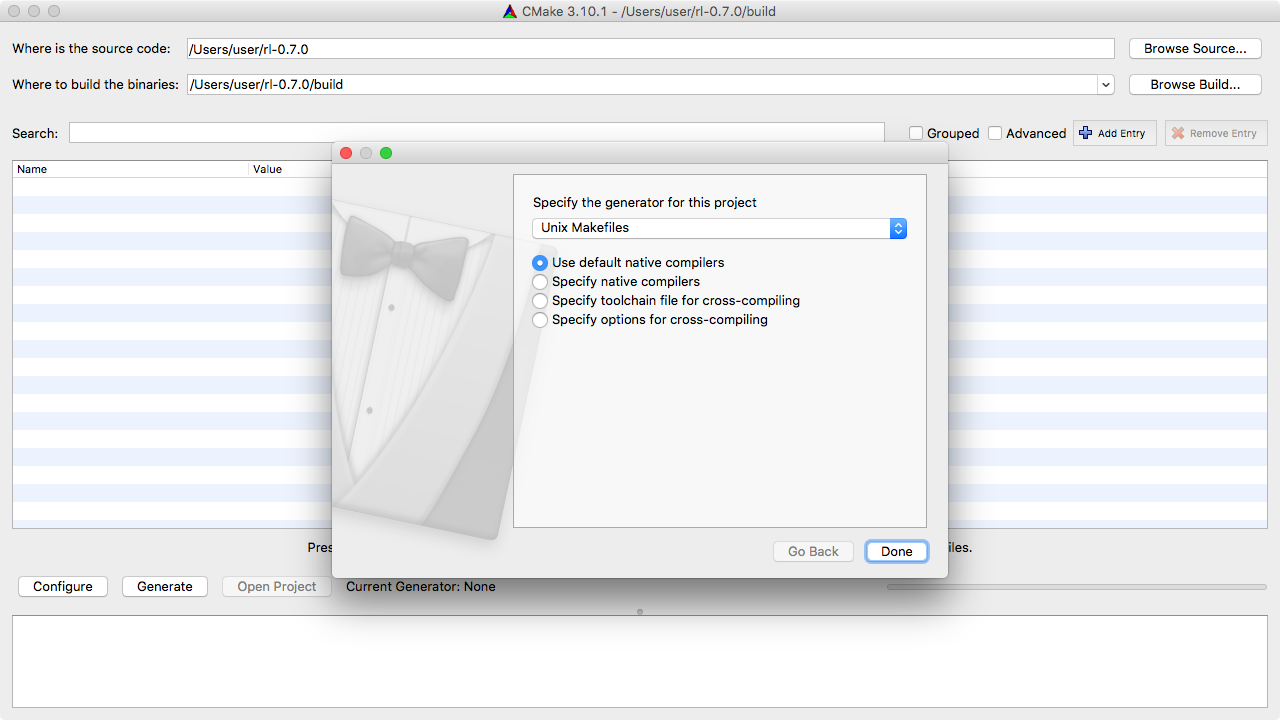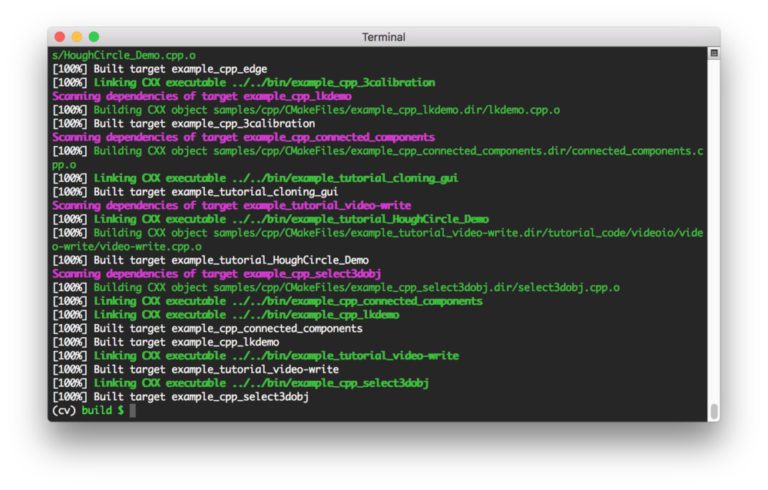我是编程新手。您能帮我安装cmake吗?我输入brew install cmake。接下来我该怎么办?. This article is part of a series on the Administrative divisions of France Administrative divisions Regions Departments Arrondissements Can. On UNIX, one may use the bootstrap script provided in the source tree to build CMake. In order to build the Windows version of CMake, you will need a current binary installation of CMake to bootstrap the build process.

- 2Install Prerequisites
- 5Run CMake
- 9Troubleshooting
Overview
This page describes how to compile the FreeCAD source code on MacOS X. For other platforms, see Compiling.
These instructions have been tested on macOS Catalina with standard XCode 11.6. It is known to work on macOS BigSur Beta with XCode 12.0 beta. If you plan to use XCode Beta, please be sure to download Command Line Tools add on through a dmg package to workaround some libz dependency issues.
This page serves as a quick start, and is not intended to be comprehensive with regard to describing all the available build options.
If you just want to evaluate the latest pre-release build of FreeCAD, you can download pre-built binaries from here.
Install Prerequisites
The following software must be installed to support the build process.
Homebrew Package Manager
Homebrew is a command line based package manager for macOS. The Homebrew main page provides an installation command line that you simply paste into a terminal window.
CMake
CMake is a build tool that generates a build configuration based on variables you specify. You then issue the 'make' command to actually build that configuration. The command-line version of CMake is automatically installed as part of the Homebrew installation, above. If you prefer to use a GUI version of CMake, you can download it from here.
Install Dependencies
FreeCAD maintains a Homebrew 'tap' which installs the required formulas and dependencies. Issue the following brew commands in your terminal.
Notes:
- 'brew install' may take quite a while, so you may want go grab a beverage. :-).
- Homebrew is currently shipping with Boost 1.73, which contains a bug to compile FreeCAD please edit the file /usr/local/opt/boost/include/boost/geometry/index/detail/rtree/visitors/insert.hpp and on line 265 declare MembersHolder::visitor as being a Public value by replacing : MembersHolder::visitor with : public MembersHolder::visitor
Get the source
In the following instructions, the source and build folders are created side-by-side under
but you can use whatever folders you want.
The following command will clone the FreeCAD git repository into a directory called FreeCAD-git.
Create the build folder.
Run CMake
Next, we will run CMake to generate the build configuration. Several options must be passed to CMake. The following table describes the options and gives some background.
CMake Options
| Name | Value | Notes |
|---|---|---|
| CMAKE_BUILD_TYPE | Release (STRING) | Release or Debug. Debug is generally used for developer-level testing but may also be required for user-level testing and troubleshooting. |
| BUILD_QT5 | 1 (BOOL) | Required to build with Qt5. |
| CMAKE_PREFIX_PATH | '/usr/local/opt/qt5/lib/cmake/;' ... (PATH) | Required to build with Qt5. See note below. You also need to add path to VTK libraries and NGLIB libraries cmake configuration file. |
| FREECAD_CREATE_MAC_APP | 1 (BOOL) | Create a FreeCAD.app bundle at the location specified in CMAKE_INSTALL_PREFIX, when the 'make install' command issued. |
| CMAKE_INSTALL_PREFIX | './..' (PATH) | Path where you want to generate the FreeCAD.app bundle. |
| FREECAD_USE_EXTERNAL_KDL | 1 (BOOL) | Required. |
| BUILD_FEM_NETGEN | 1 (BOOL) | Required. |

Note: Command line to generate CMAKE_PREFIX_PATH:
CMake GUI
Open the CMake app, and fill in the source and build folder fields. In this example, it would be /Users/username/FreeCAD/FreeCAD-git for the source, and /Users/username/FreeCAD/build for the build folder.
Next, click the Configure button to populate the list of configuration options. This will display a dialog asking you to specify what generator to use. Leave it at the default Unix Makefiles. Configuring will fail the first time because there are some options that need to be changed. Note: You will need to check the Advanced checkbox to get all of the options.
Set options from the table above, then click Configure again and then Generate.
CMake command line
Enter the following in the terminal.
Run make
Finally, from a terminal run make to compile and link FreeCAD, and generate the app bundle.
The -j option specifies how many make processes to run at once. One plus the number of CPU cores is usually a good number to use. However, if compiling fails for some reason, it is useful to rerun make without the -j option, so that you can see exactly where the error occurred.
See also Compiling - Speeding up.
If make finishes without any errors, you can now launch FreeCAD by double clicking the executable in the Finder.
Updating from Github
FreeCAD development happens fast; every day or so there are bug fixes or new features. To get the latest changes, use git to update the source directory (see Source code management), then re-run the CMake and make steps above. It is not usually necessary to start with a clean build directory in this case, and subsequent compiles will generally go much faster than the first one.
Building with Qt4 and Python 2.7
FreeCAD has transitioned from Qt 4 to Qt 5 as well as homebrew. Qt 4 is no longer available as an option for new build on macOS following Qt 5 transition. Python 2.7 has been deprecated within homebrew and upcoming macOS and we do not support it anymore for macOS build either.
Troubleshooting
Segfault on Qt5 launch
If Qt4 was previously installed via brew, and you then build with Qt5, you may get a EXC_BAD_ACCESS (SEGSEGV) exception when launching the new Qt5 build. The fix for this is to manually uninstall Qt4.
Fortran
'No CMAKE_Fortran_COMPILER could be found.' during configuration - Older versions of FreeCAD will need a fortran compiler installed. With Homebrew, do 'brew install gcc' and try configuring again, giving cmake the path to Fortran ie -DCMAKE_Fortran_COMPILER=/opt/local/bin/gfortran-mp-4.9 . Or, preferably use a more current version of FreeCAD source!
OpenGL
See OpenGL on MacOS for OpenGL issues when Qt 4.8 and earlier are used on MacOS.
FreeType

When using CMake versions older than 3.1.0, it's necessary to set CMake variable FREETYPE_INCLUDE_DIR_freetype2 manually, eg /usr/local/include/freetype2
- Installation:Download, Windows, Linux, Mac, Additional components, Docker, AppImage, Ubuntu Snap
- Basics:About FreeCAD, Interface, Mouse navigation, Selection methods, Object name, Preferences, Workbenches, Document structure, Properties; Help FreeCAD, Donate
- Help:Tutorials, Video tutorials
- Workbenches:Std Base; Arch, Draft, FEM, Image, Inspection, Mesh, OpenSCAD, Part, PartDesign, Path, Points, Raytracing, Reverse Engineering, Sketcher, Spreadsheet, Start, Surface, TechDraw, Test Framework, Web
- Deprecated or unmaintained workbenches:Complete, Drawing, Robot
- Addons:Addon Manager, External workbenches, Scripting and macros
- Hubs:User hub, Power users hub, Developer hub
cmake openssl
brew install mongodb with-openssl
brew openssl dev
openssl symlink
how to compile openssl on mac
mac libcrypto
cmake build openssl
i am using the following cmake commands
it works on linux and on Mac - but on mac it uses the osx-shipped libssl - wich throws a alot of deprecation warnings e.g. 'SSL_library_init' is deprecated: first deprecated in OS X 10.7'
Brew Install Gcc
using brew i already installed a newer - openssl-offical - libssl - how can i tell the pkg_search_module in cmake to find and use the brew version?
regards
As of late 2016 this works for me:
In CMakeLists.txt:
Run cmake like this:
To install OpenSSL, I tried brew install openssl And it returns Make sure you can see hidden files. in install-mac.sh change cmake .. to cmake I am using the newest CMake (3.9.3) from Homebrew along with LLVM 5.0.0 also from Brew, because Clang here has OpenMP support. This worked in CMake 3.8.2 with LLVM 5.
ok got it working :)
removed the cmake build folder and rerun the cmake .. and the above macro now finds the 1.0.2 libssl :)
I think this is because OS X is moving away from OpenSSL not sure .com/Homebrew/homebrew/blob/master/Library/Formula/openssl.rb Build OpenSSL with CMake on MacOS, Win32, Win64 and cross compile for Android, IOS - janbar/openssl-cmake
Brew Install Cmake
The cause of this issue is a bug in CMake -- it does not use alternate pkg-config paths correctly.
According to the merge request attached to the bug, the fix should be in cmake 3.17.0 (to be released in Feb 2020).
Otherwise, use this work-around. Hard coding it in your CMakeLists.txt will make things bad for people who use MacPorts instead of Homebrew.
Homebrew error downloading and linking OpenSSL. And just a reminder — remember to add -lssl and -lcrypto flags for your compiler. brendanzab changed the title Could not find OpenSSL on OS X 10.11 CMake could not find OpenSSL on OS X 10.11 Dec 11, 2015 This comment has been minimized. Sign in to view
Jonathan is right. The MacOS system open ssl is considered insecure. Here is what works for me
Install or upgrade openssl via brew
Add these to your CMakefile. Instead of hard coding you might choose to use a command line parameter or environment variable
include_directories(BEFORE /usr/local/Cellar/openssl/1.0.2p/include)find_library(OPENSSL_LIB ssl PATHS /usr/local/Cellar/openssl/1.0.2p/lib NO_DEFAULT_PATH)find_library(CRYPTO_LIB crypto PATHS /usr/local/Cellar/openssl/1.0.2p/lib NO_DEFAULT_PATH)
To find the OpenSSL directory use the following command:
I've been maintaining a macOS project for a while and recently with the update to Mojave, cmake no longer can find libraries located in If the screen prompts you to enter a password, please enter your Mac's user password to continue. When you type the password, it won't be displayed on screen, but the system would accept it. So just type your password and press ENTER/RETURN key. Then wait for the command to finish. Run: brew install cmake; Done! You can now use cmake.
Yes, as mentioned in the home-brew issue above, the headers are missing. It helps to compile and link against home-brew's openssl cmake I have used brew install openssl to download and install openssl v1.0.2f, however, it comes back saying: A CA file has been bootstrapped using certificates from the system keychain. To add additio
Brew Cmake
Running CLion 1.2.4 on OSX 10.11.3, I have installed openssl 1.0.2f via brew and added the following to my CMakeLists.txt file: set( OPENSSL_ROOT_DIR Installing CMake. There are several ways to install CMake, depending on your platform. Windows. There are pre-compiled binaries available on the Download page for Windows as MSI packages and ZIP files. One may alternatively download and build CMake from source. The Download page also provides source releases. In order to build CMake from a
brew install Caskroom/cask/xquartz brew install gcc cmake autoconf automake libtool openssl pkg-config. Then: EITHER export OPENSSL_ROOT_DIR=`brew For example, the Linux-x86_64 tar file is all under the directory cmake–Linux-x86_64. This prefix can be removed as long as the share, bin, man and doc directories are moved relative to each other. To build the source distributions, unpack them with zip or tar and follow the instructions in Readme.txt at the top of the source tree.
Comments
- You could use
FIND_PACKAGE(OpenSSL)and specify the location of your OpenSSL installation like it is described here: stackoverflow.com/a/16249265/678093 - To be version independent the following works:
-DOPENSSL_ROOT_DIR=/usr/local/opt/openssl - This does not work anymore: Warning: Refusing to link: openssl Linking keg-only openssl means you may end up linking against the insecure, deprecated system OpenSSL while using the headers from Homebrew's openssl.
export PKG_CONFIG_PATH='/usr/local/opt/openssl@1.1/lib/pkgconfig'beforepkg-config --modversion opensslin order for it to work
Hot Questions




